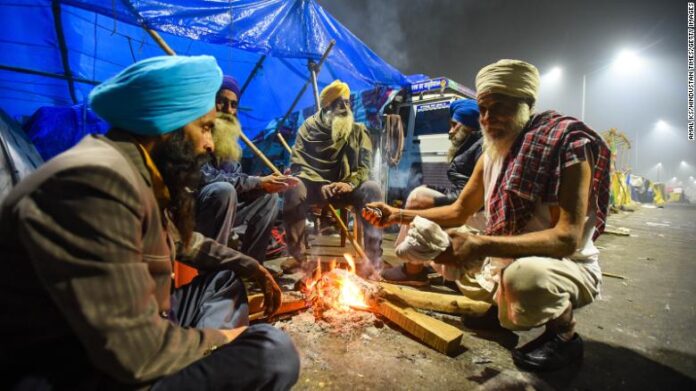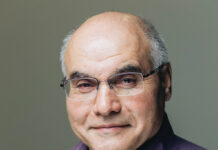
On Jan. 26, 2021, the farmers’ protest in India escalated when thousands engaged in the largest tractor march in history, where more than 200,000 tractors were used. The march had been planned for weeks and was scheduled to take place on Jan. 26 – India’s Republic Day, the anniversary of the day the Indian Constitution was enacted in 1950.
A small group of protestors who entered the Red Fort in Delhi were met with violence, beaten with batons and faced tear gas canons after more than two months of peaceful protesting.
Farmers are protesting for the repeal of three laws that will destroy their livelihoods, and allow for corporate exploitation.
“It’s been over two months since the farmers of India marched over to the capital, Delhi, to demand their rights. The rights that the government of India is trying to take away from them, that can eventually lead to detrimental consequences and damage their livelihoods. After two months of living out on the streets, peacefully protesting, our farmers have faced nothing but brutality. It’s heartbreaking to see elders the age of our grandparents sleeping out in the cold. For what? Their land. Their heritage. Their rights. It disgusts me that India, the largest democracy in the world, would stoop down to such a low level to hurt their own people,” Parmpreet Mangat, a third-year Honours Science student, said.
The internet was suspended in Delhi and surrounding border areas on Republic Day, following the violence. The Haryana government shutdown the internet in most parts of the state until Feb. 1. CNN reported that officials said that this internet shutdown should have been lifted on Jan. 31, 2021, however, Paramjeet Singh Katyal, spokesperson for the Samyukta Kisan Morcha, said that the internet was still not working on Feb. 1. Human Rights Watch reported that the Internet Freedom Foundation, said that the shutdown was being used as a way “to suppress the free flow of information related to peaceful assembly and the fundamental right to protest.”
As of Feb. 6, 2021, 206 protesters have died during the protests.
At least nine journalists in India have been charged for reporting the killing of Navreet Singh Hundal, a protester, by a gunshot from a member of the Delhi police. Indian authorities claim that gunshots were not fired. Although the Delhi police alleges this, post-mortem reports have confirmed that this injury is consistent with that of at least one gunshot wound to the head. Farmers at the site were the first to report that Hundal had died from a gunshot wound, and not from the fall of the overturned tractor.
“One doctor told me that my grandson was hit by gunshot, but said they could not write that a bullet killed him,” Hardip Singh Dibdiba, Hundal’s grandfather, told The Guardian.
Hundal’s family also said that they were not given access to x-rays conducted as part of the post-mortem exam. His post-mortem documents state that his death resulted from “shock and a haemorrhage” from a head injury. Police allege that Hundal died from his tractor overturning, while protesters at the scene allege that his tractor was overturned due to him being shot.
“To me this is one gunshot wound, possibly two, unless proved otherwise,” Dr. Basil Purdue, UK pathologist, told The Guardian, “you cannot get these injuries from a fall.”
Journalists and people who tweeted about the reported gunshots are facing criminal charges, including sedition in five states in India. Some of those facing charges include: Shashi Tharoor, an opposition party politician, who tweeted about the allegations; Kanwardeep Singh, a journalist from Times of India; Siddharth Varadarajan, editor of The Wire, India; and Vinod Jose, editor of the current affairs magazine, The Caravan.
Freelance journalist, Mandeep Punia, who regularly contributes to The Caravan, was abducted by Delhi Police on Jan. 30, 2021. Punia posted a video on Facebook on Jan. 29 reporting on the arrival of a group of people to the Singhu border who threw stones and a petrol bomb at protestors and attempted to set protestors’ belongings on fire. Punia reported that two of the perpetrators were members of the BJP, the ruling party in India. He was arrested by police and taken to Tihar Jail. Punia recounted his arrest and jail time through an interview with The Caravan, where he details the police brutality he faced. He was beaten, and his camera and phone were broken by police. He took notes of what he was experiencing in the jail by writing on his arms and legs. When he asked police what his crime was, he told The Caravan they were saying, “You will tell who pelted stones on farmers, is it? Keep reporting,” and, “you want to report? Make a video? Come, we will make you do it.” His abduction video went viral, causing a stir on social media with calls to have Punia released.
“While they were beating Mandeep at a police station, an officer came in and said, ‘The video of us picking him up has gone viral.’ After that, they took him to a hospital for a medical examination. Just imagine what would have happened if that video hadn’t come out & gone viral,” Meghand S, associate editor at Newslaundry, tweeted on Feb. 4.
Nodeep Kaur, 24-year-old Dalit labour rights activist and member of the Mazdoor Adhikar Sangathan (MAS), a labour union, was arrested by Haryana police on Jan. 12, 2021, and was denied bail on Feb. 2, 2021. Her next bail hearing is scheduled for Feb. 8, 2021. At this point, she would have been detained for 26 days. The Wire India reported that Kaur’s Lawyer, Jitendra Kumar, said that the medical examination sought after her arrest details wounds that “points to the fact that Nodeep was sexually assaulted in police custody.” Campaigns, such as the hashtag #freenodeepkaur, have been started on social media to get authorities to release her from custody since a similar approach helped release Punia.
The Guardian reported that 200 farmers were arrested during the protests on Jan. 26, 2021, many being detained under anti-terrorism laws. The Trolley Times, the official newspaper of the farmers protest, reported that as of Feb. 6, 2021, 123 people are missing.
Mangat along with Komal Dhaliwal, a third-year Public Health student, organized the Farmers Protest Rally in KW on Dec. 12, 2020.
“Earlier in December my friend Komal and I organized a region-wide peaceful car protest,” Mangat said, “I believe that it is very important to speak up against violation and injustice no matter where in the world it is happening.”
“We had over 350 cars present and approximately 1200 people participated. The purpose of the protest was to inform the community about the issue taking place in India. It definitely made an impact as several news channels and papers such as CTV Kitchener, CBC News, 570 News, The Record were all present and captured the protest live. This helped us spread our message amongst residents of our region, in hopes that they would take a minute of their day to look into the injustice taking place.”
Mayank Kohli, a first-year Accounting and Financial Management student, attended the farmers protest in Delhi.
“On Jan. 10, 2021, I visited the Delhi border to witness the farmer protest. We received a warm and kind welcome from all the farmers. Ladies were busy preparing food while men served the food to any person who would come to see the protest. There were no aggressive or violent protestors. The environment felt completely positive and safe,” Kohli said.
Despite the magnitude of the protest, western media has given the issue little attention, until Rihanna tweeted a CNN article.
“Why aren’t we talking about this?! #FarmersProtest,” Rihanna tweeted on Feb. 2, 2021.
“Rihanna tweeted an article about the unethical practices the police and government are taking and it went viral. It got so much attention that prominent figures, such as actors and other artists, spoke out for the first time in months. Greta Thunberg has also posted many times in addition to various NBA and NFL players, one of which has even donated $10,000 to support farmers in India,” Simran Parmar, UW Sikh Chaplain, said.
Celebrities and other well-known individuals, including Meena Harris and Greta Thunberg, have brought light to the issue multiple times since the first time it was brought into western light by Rihanna. Raising awareness of these human rights violations has captured the attention of large organizations such as World Affairs, Human Rights Watch and the United Nations Human Rights Council.
Some other notable names who used their platforms to bring awareness to the issue include Comedian Hasan Minhaj, Internet Influencer Amanda Cerny, Actor and Producer Susan Sarandon, Lawyer and niece of U.S Vice President Meena Harris.
Rupi Kaur – poet, illustrator, author, and UW BA ’15 English Alumna – has been spreading awareness about the protests before mainstream media and thanked Rihanna for highlighting the issue.
“With big influencers such as Rihanna speaking up for farmers, I hope that this will be an eye-opener for the rest of the world and everyone will unite together to help spread awareness for the farmers of India. Western pressurization will indeed play a role. The largest protest in the history of the world is taking place and it cannot go unseen. So be that voice and use your platforms to speak up,” Mangat shared.
Rihanna’s tweet also woke up Bollywood stars who had remained silent up until this point, with many tweeting in support of the government.
“The support being by prominent figures in the west has upset many politicians and citizens who are supporting the exploitation of farmers with the three new laws,” Simran Parmar said.
Delhi police filed a FIR (First Information Report) against Greta Thunberg for a tweet in which she shared a farmers protest “toolkit.”
“I still #StandWithFarmers and support their peaceful protest. No amount of hate, threats or violations of human rights will ever change that. #FarmersProtest,” Thunberg tweeted, on Feb. 4, 2021.
Images have emerged on social media of government supporters setting images of Rihanna, Greta Thunberg and Meena Harris on fire after their tweets in support of farmers.
“Just this last week, we saw what was possible when the community comes together and tirelessly pushes awareness about the inherent issues at hand. Getting the attention of Rihanna, who starts a domino effect leading to a multitude of celebrities, influencers and athletes such as Kyle Kuzma, Greta Thunberg, Russ Diemon, amongst many more beginning to show their solidarity. Simply goes to show how any platform is a platform regardless of its size,” Gurvir Parmar, a third-year Kinesiology student, said.
Before Rihanna brought awareness to the issue, there was very little media attention. Still, social media has been filled with updates coming directly from the protest sites, with many people showing their support for the farmers through sharing posts on social media.
“The largest struggle has certainly been the extreme lack of national attention the matter gets. As a result, it’s been so crucial up to this point to spread awareness to your friends about the brutal treatment farmers experience now, but also historically. What continues to happen now are clear cut human rights violations, and it’s important as a community to speak up for injustice anywhere,” Gurvir Parmar said.
Social media has played a vital role in bringing awareness to the protests – numerous videos and images show police brutality and injured demonstrators.
There have been numerous human rights violations by the Indian government. The government claimed that the public internet shutdown was to “maintain public safety”. However, under international human rights law, India must ensure that any restrictions of the internet or other forms of communication are a done for a specific security issue and cannot be used for a broad purpose that restricts the “flow of information or to harm people’s ability to freely assemble and express political views,” Human Rights Watch reported.
“Cutting off water, electricity, internet and other essential supplies is already unethical enough, not to mention the unethical abductions, arrests and physical violence being committed by the police. I think there is a big need to keep pushing awareness on social media to ensure the safety of all protestors,” Simran Parmar said.
In addition to the internet shutdown, the government cut off food and fresh water supply from protesters. Protestors from the Ghazipur border walked to Shamli, a city, to bring back water, while NGO and charity Khalsa Aid brought water to the protest sites. There has also been the removal of washroom facilities by the government.
“After all that took place on Republic Day, the government is doing its best to make sure farmers give up by taking away water supply, cutting internet connections, putting up more barricades,” Mangat said.
Delhi police have filed 44 criminal cases and arrested 122 people concerning the violence and filed cases of rioting, attempted murder, and criminal conspiracy against “at least 37 well-known farmer’s union leaders and activists.”, some, among others are “Medha Patkar and Yogendra Yadav, the president of the Bharatiya Kisan Union’s Haryana unit, Gurnam Singh Chaduni, and the Bharatiya Kisan Union spokesperson, Rakesh Tikait,” Human Rights Watch reported.
Most of the leaders have been involved in the eleven talks with the BJP. Human Rights Watch also reported these farmer unions have dissociated themselves from the violence.
US Doctor, Dr. Swaiman Singh and his team were beaten by police, leaving the three doctors with broken arms and a volunteer with a broken skull. Video footage of the unprovoked attack was posted to social media, at the time of the incident, the team was giving stitches to an injured police officer. In a video posted by Dr. Singh on Jan. 28, 2021, he says 10-15 officers were beating the group of doctors, he recounts the brutality where police officers were beating protesters with batons and firing tear gas canisters into the faces of protesters.
Chakka Jam, which loosely translates to “Traffic Blockade” is another protest that took place on Feb. 6, 2021, and lasted from 12 p.m. – 3 p.m. Demonstrators blocked several national and state highways via sit-in. The internet has been suspended against the Singhu, Tikri and Ghazipur borders amid the Chakka Jam protest, on the order of the Ministry of Home Affairs. The Internet was set to remain suspended until the night of Feb. 6. In addition to this internet blackout, surrounding areas are not set to have internet restored until 11:59 p.m. on Feb. 6, 2021.
“I encourage everyone who doesn’t know about why the farmers are protesting to please take action and educate yourselves. @sikhexpo on Instagram is an amazing place to start to learn about what’s happening. This is a human rights issue and deserves awareness. I request everyone to help us in this fight, raise awareness and help us to get these bills eradicated,” Dhaliwal said.
As of Jan. 28, 2021, there have been eleven talks between the Indian government and farmer union leaders, ending in a deadlock.
“Every citizen in a democracy has the right to protest and not be faced with violence by police. It is evident that this democratic right is non-existent in India,” said Simran Parmar, “the entire world is watching right now.”






























